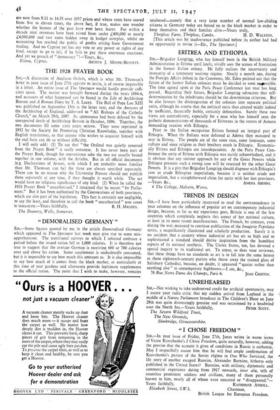ERITREA AND ETHIOPIA_
SIR,—Brigadier Longrigg, who has himself been in the British Military Administration in Eritrea until lately, vividly sees the scenes of frustration in the former Italian colony. He fully realises the uncertainty and insecurity of a temporary wartime regime. Nearly a month ago, during the Foreign Affairs debate in the Commons, Mr. Eden pointed out that the future of the former Italian colonies must be decided as soon aampossible. The time agreed upon at the Paris Peace Conference last year has long passed. Regarding their future, Brigadier Longrigg advocates that self- determination by the inhabitants should be the determining criterion. But he also favours the disintegration of the colonies into separate political units, although he asserts that the political units thus created might indeed be inefficient, financially feeble, certainly defenceless. Surely these two views are contradictory, especially for a man who has himself seen the pathetic demonstrations of thousands of Eritreans in the streets of Asmara demanding reunion with Ethiopia.
Prior to the Italian occupation Eritrea formed an integral part of Ethiopia. When the Italians were defeated at Adowa they managed to stay in Eritrea. The people are of the same race, same language, same culture and same religion as their brothers south in Ethiopia. Economic- ally Eritrea and Ethiopia are interdependent. At the Paris Peace Con- ference the unity of Eritrea with Ethiopia was tacitly acknowledged, and it is obvious that any sinister approach by any of the Great Powers while Ethiopia presents such a strong case will be resented by the other Great Powers. It is a pity that Brigadier Longrigg should dispense with Ethiopia's case as crude Ethiopian imperialism, because it is neither crude nor imperialism, but a straightforward claim for unity with her lost provinces.


































 Previous page
Previous page